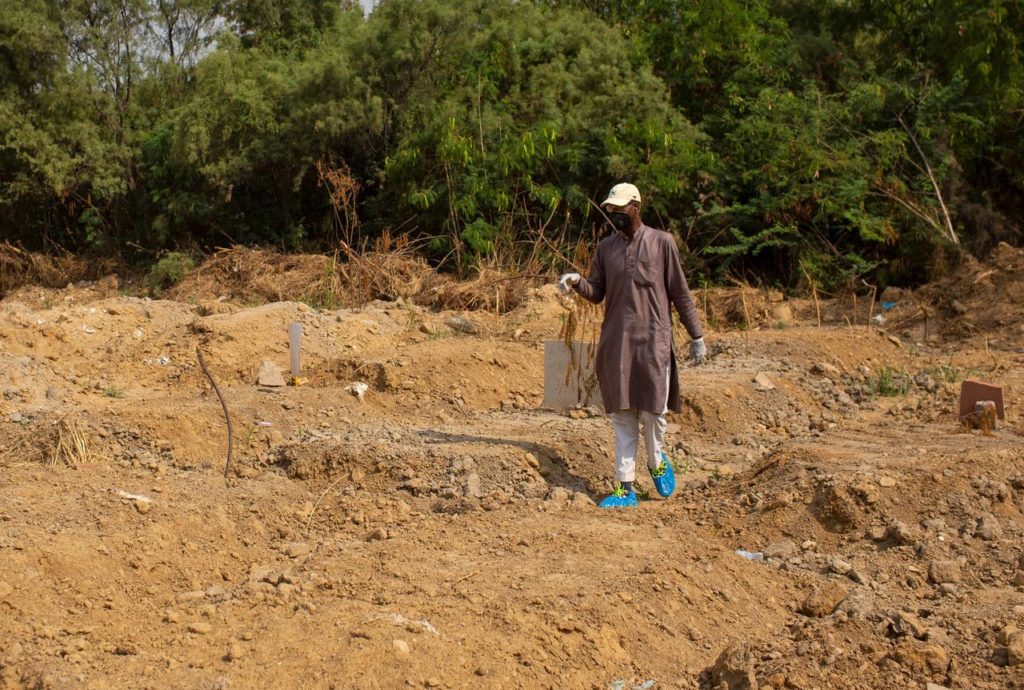As Families Bury Covid-19 Victims, A Gravedigger Watches On
May 7, 2020 | Pratirodh Bureau
Mohammad Shameem, a 38-year-old grave digger, walks at the burial site of people who died from the coronavirus disease at a graveyard in New Delhi on May 6, 2020
Belonging to the third generation in a family of Indian cemetery workers, Mohammad Shameem had little other choice in life than to dig graves.
But as the novel coronavirus makes his work too dangerous, he now watches on as families in India’s capital bury victims themselves. Sometimes, though, there aren’t enough mortuary workers and men to lift the body. Then Shameem has to help.
“I am always tense,” the 38-year-old father of four said while waiting for the next corpse to be brought for burial.
“I wonder what will happen when the body comes. I hope that I won’t have to touch it.”
Infections have crossed 50,000, with over 1,700 deaths in India, but the world’s second largest country has still to see the upward curve in infections begin to level off despite the government ordering a nationwide lockdown on March 25.
And experts worry that the nation’s overstretched medical facilities – and mortuaries – will be unable to cope if cases surge.
Shameem remembers burying the victims of a plane crash at Jadid Qabristan, an Islamic graveyard by the ruins of Delhi’s city walls.
But the fear surrounding the coronavirus epidemic, and its scale, is beyond anything he has experienced since began working with his now-retired father two decades ago.
He waits for bodies in a cleared patch of wasteland abutting the main cemetery, where more than seventy suspected and confirmed coronavirus victims have been buried since the first death in the capital a month ago.
Broken bits of slate and twigs mark the graves. Others are unmarked altogether.
When deaths began to rise, a doctor from a local hospital got in touch with the owners of the graveyard, and they passed on Shameem’s number.
He has sent his children to stay with their grandparents, in the house two doors down, though he still has little formal training in the precautions he and his family should take.
“Before we didn’t know what we were doing at all,” he said, touching his face with a gloved hand.
Normally, he is paid for each grave he and his men dig.
“You will laugh when I tell you how much,” he said, before revealing his fee is Rs 100 per body.
Now, the double-depth graves are dug by a yellow excavator. Only one driver is prepared to come, Shameem said.
On Wednesday, two bodies arrived in an ambulance, a handful of male relatives following on scooters behind. The families pool their strongest men together to lift the bodies.
They hesitantly put on the protective equipment brought with them. The tallest man’s suit kept popping open as they prayed.
One of the victims, 33-year-old dialysis patient Mohammad Fayzan, died on Tuesday.
“If there was no coronavirus all the people would have come. But now they can’t,” his brother, Faraz said through tears.
At the last moment, another brother ran unprotected down to the grave, to see Mohammad Fayzan’s face for a final time.
Shameem called to the men to throw their suits into the grave.
He gestured to the driver to round the earth as it piled onto Fayzan’s body, and turned away.
